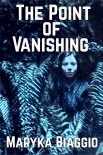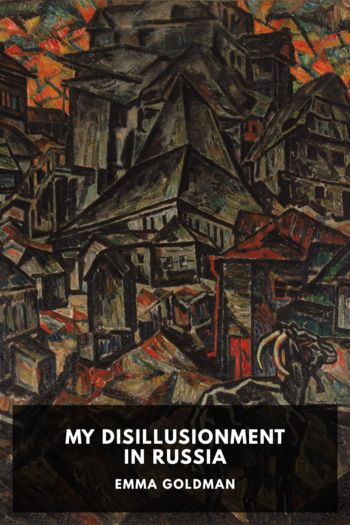The Point of Vanishing Maryka Biaggio (hardest books to read TXT) 📖

- Author: Maryka Biaggio
Book online «The Point of Vanishing Maryka Biaggio (hardest books to read TXT) 📖». Author Maryka Biaggio
“Not very level,” said Barbara.
“No.” He reached into the side compartment of his pack and pulled out the hatchet. “You cut the lower branches off those trees. That’ll give us more room, and we can use the boughs to level the ground.”
Barbara hacked off branches and handed them to her father. He padded the area, laying the branches more thickly at the lower level. They pitched their canvas tent with the opening away from the wind and, using three tree trunks and a sturdy branch, strung their tarp aslant over it.
They usually placed the tarp underneath the tent, so Barbara asked, “Won’t the bottom of the tent get wet?”
“If we don’t protect the top, we’ll get soaked. Hand me the hatchet, and I’ll dig a trench.”
Her father chipped at the ground while Barbara gathered their gear and pitched it into the tent.
He whacked his way around the tent perimeter, completing the trench’s circuit, and stood to study the sky. “Yup, we’re in for a certifiable soaker.”
The wind had reached a roaring pitch. Turning his back on it, he said, “No cooked dinner for us tonight.”
Barbara raised her voice against the howl. “I don’t mind. Bear and moose never use campfires.”
He scrunched up his face as if she’d said something silly. “Better get settled before the skies open.”
They crawled inside and unfurled their sleeping bags.
Barbara surveyed their supplies. “We can have cornbread and cheese.”
“Just what I was thinking,” said her father. “And it sounds mighty good, too.”
As the storm buffeted their tent walls, they donned their wool sweaters and hunkered down. Sitting cross-legged on their sleeping bags, they feasted on a hunk of cheddar and the last of their cornbread.
Barbara washed down a mouthful of bread with water they’d gathered from a brook. “My friend Lucy keeps begging me to go to her church, but I don’t want to.”
“Then don’t. I sure as hell won’t tell you to go.”
“She says I’ll not go to heaven if I don’t. And she doesn’t want to be responsible for my soul. Or be friends with me if I don’t go.”
“You’ll have to decide about church and your soul on your own.”
“Why don’t you and Mother go to church?”
“Your mother can go if she wants, but it’s not for me.” He switched the cross of his legs. “Have you asked her about this?”
“Daaadddy,” Barbara chided. “You know Mother and I don’t talk about such things. And I want to know what you think.”
“Well, I think religion is bunkum.” He cut off more slabs of cheese for them.
“Did you go to church when you were little?”
“Humph,” he snorted, “every damn Sunday. My parents were genuine Bible thumpers.”
“You don’t believe in the Bible?”
“I consider it a collection of tales and allegories.”
“Do you believe in God?”
“That,” he said, swinging his head in an arc, “is the pivotal question. But first, you must answer it for yourself.”
“Yes, I believe in God.” Barbara grinned and smoothed her hands, greasy from the cheese, on her pants. “But not like Lucy. And I’ll not buckle just so we can stay friends.”
“What sort of God do you believe in?”
Barbara rested her chin on her fist and thought for a moment. “The God that brews mighty storms and turns frost into dazzling feathers and makes butterflies so other-worldly.”
“I see you’ve worked it out nicely on your own,” he said.
She flapped her hand toward the tent opening. “What church can match this mountain, this wilderness?”
Her father gave her a knowing smile. “Or the mysteries of the ocean? Or the mind?”
Barbara leaned over her crossed legs and asked, “Do you believe in God?”
“If pressed, I’d say I’m an agnostic. But, honestly, I don’t worry about it.” He retrieved the packet of chocolate from his food sack and offered her some.
Barbara let a pad of chocolate melt in her mouth. “Why don’t you and your friends have talks like this?”
“Most grown-ups just grind away at ordinary subjects. Don’t want to end up arguing, I suppose.”
“But isn’t this talk infinitely more interesting than gossiping about neighbors or complaining about bills?”
“Religion’s a private matter, something you shouldn’t interrogate about. And there are always neighbors to contend with and money to manage.” He brushed his hands together. “Except at times like this.”
“I love our trips, Daddy. Can we go canoeing next time?”
“Sure. If you’re big enough to climb a mountain, you’re strong enough to paddle a canoe.”
The walls of their tent buckled and billowed as the wind ripped at them. Barbara poked her head out for a view. Clouds shape-shifted, commingling like a covey of ashen ghosts. Rain pelted down in a roaring onslaught, sheets of it gathering on the tarp and streaming off in chaotic beads and streams. She narrowed her eyes against the shards of rain splattering her face. Along the mountain slope, tentacles of lightning flashed. Thunder cracked, louder than Barbara had ever heard as if the clouds gathered up the din and hurled it back at the rocky ground.
Her father asked, “What’s the weather report?”
Barbara pulled back in and wiped her wet face with a sleeve. “A little nor’easter blowing in, I suspect.”
He chuckled. “Not much scares you, does it?”
“Not like I haven’t seen a storm before. And you’ll protect me.”
“It’s my job. And not hard in your delightful company. Now, let’s get some sleep.”
Barbara burrowed into her sleeping bag. The crack and roar of the storm wrapped itself around her dreams, where she curled up in a den beside a big warm bear and slept cozy as a cub while the biggest storm ever raged outside.
CHAPTER TEN
BARBARA AT FOURTEEN
New Haven, April 1928
Barbara stood at the bottom of the stairs and called, “Mother, where are you?”
“Shush, Sabra’s napping.” Her mother traipsed down the stairs and motioned Barbara to follow her to the sitting room. “What is it?”
“There’s no mail today.” For weeks, each mid-afternoon, Barbara had camped out on the sofa, watching for the mail carrier. She should’ve heard from her father by now. How could he not respond to





Comments (0)